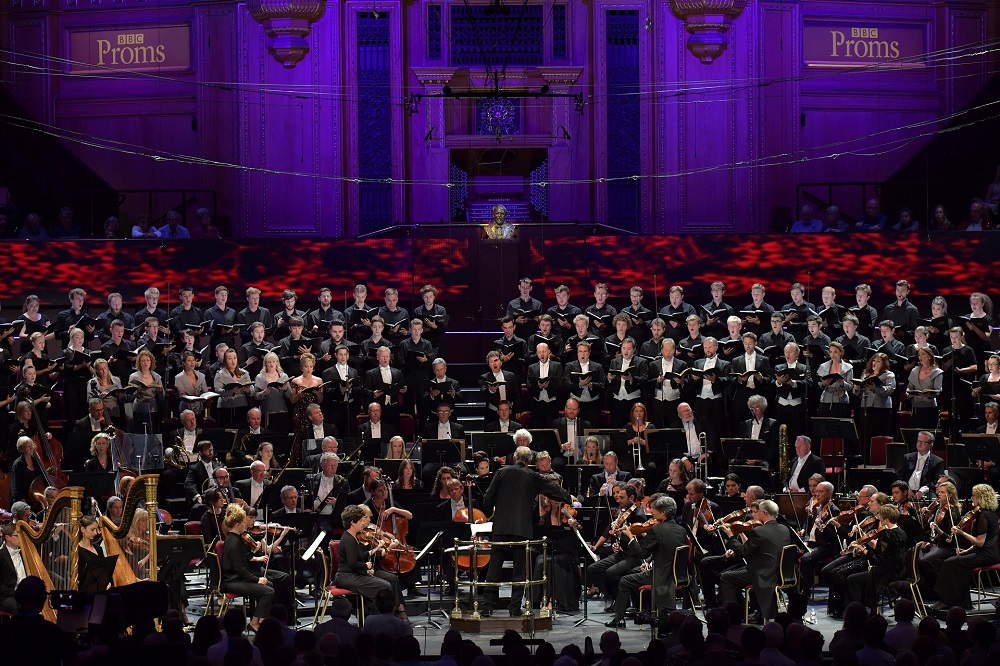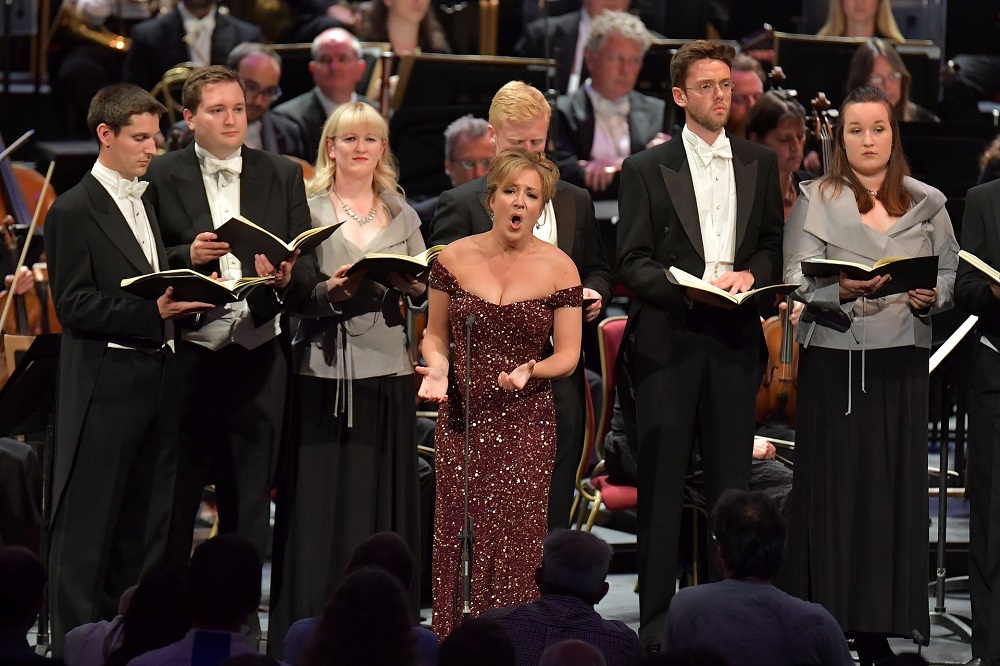Prom 20: Roméo et Juliette, Monteverdi Choir, NYCoS, ORR, Gardiner | reviews, news & interviews
Prom 20: Roméo et Juliette, Monteverdi Choir, NYCoS, ORR, Gardiner
Prom 20: Roméo et Juliette, Monteverdi Choir, NYCoS, ORR, Gardiner
The full Berlioz kaleidoscope well served by one of his greatest interpreters
Like Prokofiev in his full-length ballet a century later, Berlioz seems to have been inspired by Shakespeare's Romeo and Juliet to bring forth his most compendious score. John Eliot Gardiner, who knows and loves every bar of light and shade in this great Berlioz kaleidoscope, offered even more of it than usual at last night's Prom.
As on his unsurpassable recording with the Orchestre Révolutionnaire et Romantique, where they appear as supplements, we also got the second Prologue for semichorus omitted from the final version, orchestrated by Oliver Knussen, and the extra bars of the Latin Requiem inserted into the funeral cortege for the seemingly dead Juliet which follows. Even these rarities breathe the originality which teems throughout the work, the second Prologue especially so with a small number of basses grinding chromatically upwards from the depths. And the select voices of the Monteverdi Choir played their part at the front of the stage, conducted by Dinis Sousa, as distinctively as any of the other components in this amazing hybrid.
Not that the singers are really the heart and soul of the work. In his foreword to the score, Berlioz called it a "Choral Symphony" but reversed Beethoven's feat in his Ninth Symphony of making the human voice take over where the orchestra can go no further; he wanted "instrumental language" to offer symphonic "speech" because he found it "richer, more varied, less precise, and by its very indefiniteness incomparably more powerful".
Gardiner makes you believe that. Although a restless audience had not settled down by the time the first violins delineated Romeo alone - no-one would think to move a muscle in the music it inspired, the cellos' floating in space at the start of Wagner's Tristan und Isolde - it was a sensational journey from oboist Michael Nieseemann's flights of fancy to the many delicious false endings before lights out on the Capulets' ball. The ORR players sighed their ecstasies and stammered their scruples in the great Love Scene and convinced us that the arrival of Romeo at the Capulet vault has cries and groans which could have been composed yesterday, so startlingly modern do they sound (the Kemble/Garrick version which Berlioz saw in Paris has Juliet stir before Romeo expires, hence a few seconds of frenzied rapture followed by despair).
Unlike Haitink in Mahler's Third Symphony the night before, though, Gardiner had not adapted to the pitfalls as well as the virtues of the Albert Hall; the opening skirmish between Montagues and Capulets, so electrifying on his recording, went at too fast a lick for the articulation to be made out given authentic frailty and the venue's reverberation. Natural horns let him down in the dream-hunt which passes through the forest of Queen Mab's Scherzo, and his supreme, dancing vigilance here wasn't reflected in the very last bars, where the orchestra suddenly fell apart. From where I was sitting, the antique cymbalists - the adjective applies to the instrument, not the players - could only be heard when clanging with the ensemble, despite entering in front of the rest of the orchestra; alas, none of the first soloist's three tings - tantalisingly marked p, pp and ppp - could be heard at all from where I was sitting.
There was too much virtuoso playing, though, to let this linger as a drawback. As for the three soloists, it's a rare mezzo who can really create a sensation in the diversion of a brief, harp-accompanied ode to first love. Catherine Robbin on the recording was head and shoulders above the competition when I compared available versions on BBC Radio 3's Building a Library, and better still last night was Julie Boulianne (pictured above centre with members of the Monteverdi Choir), knocking spots off any of the voices on display in Glyndebourne's underwhelming current production of Berlioz's Béatrice et Bénédict. Jean-Paul Fouchécourt is the master of the brief Mab preview, Mercutio in miniature; he made his mark, too.
Only Laurent Naouri, in the only character role of reconciliatory Friar Laurence, lacked the muscular-Christian, big bass voice which can inject new life as dramatic symphony yields to oratorio in the last scene (David Soar made so much more of an impact for Andrew Davis earlier this year). Naouri's French inflections and stage presence made some amends, though, and the final injection of brilliance we needed came from the Monteverdis now joined by the superb voices of the National Youth Choir of Scotland, trained with his usual devotion by the excellent Christopher Bell. Not only were their sound and diction unsurpassable; there was also something moving and timely about young people, and Scots at that, singing of eternal friendship and hope in a better future after a catastrophe.
rating
Explore topics
Share this article
more Classical music
 First Person: Leeds Lieder Festival director and pianist Joseph Middleton on a beloved organisation back from the brink
Arts Council funding restored after the blow of 2023, new paths are being forged
First Person: Leeds Lieder Festival director and pianist Joseph Middleton on a beloved organisation back from the brink
Arts Council funding restored after the blow of 2023, new paths are being forged
 Classical CDs: Nymphs, magots and buckgoats
Epic symphonies, popular music from 17th century London and an engrossing tribute to a great Spanish pianist
Classical CDs: Nymphs, magots and buckgoats
Epic symphonies, popular music from 17th century London and an engrossing tribute to a great Spanish pianist
 Sheku Kanneh-Mason, Philharmonia Chorus, RPO, Petrenko, RFH review - poetic cello, blazing chorus
Atmospheric Elgar and Weinberg, but Rachmaninov's 'The Bells' takes the palm
Sheku Kanneh-Mason, Philharmonia Chorus, RPO, Petrenko, RFH review - poetic cello, blazing chorus
Atmospheric Elgar and Weinberg, but Rachmaninov's 'The Bells' takes the palm
 Daphnis et Chloé, Tenebrae, LSO, Pappano, Barbican review - lighting up Ravel’s ‘choreographic symphony’
All details outstanding in the lavish canvas of a giant masterpiece
Daphnis et Chloé, Tenebrae, LSO, Pappano, Barbican review - lighting up Ravel’s ‘choreographic symphony’
All details outstanding in the lavish canvas of a giant masterpiece
 Goldscheider, Spence, Britten Sinfonia, Milton Court review - heroic evening songs and a jolly horn ramble
Direct, cheerful new concerto by Huw Watkins, but the programme didn’t quite cohere
Goldscheider, Spence, Britten Sinfonia, Milton Court review - heroic evening songs and a jolly horn ramble
Direct, cheerful new concerto by Huw Watkins, but the programme didn’t quite cohere
 Marwood, Power, Watkins, Hallé, Adès, Bridgewater Hall, Manchester review - sonic adventure and luxuriance
Premiere of a mesmeric piece from composer Oliver Leith
Marwood, Power, Watkins, Hallé, Adès, Bridgewater Hall, Manchester review - sonic adventure and luxuriance
Premiere of a mesmeric piece from composer Oliver Leith
 Elmore String Quartet, Kings Place review - impressive playing from an emerging group
A new work holds its own alongside acknowledged masterpieces
Elmore String Quartet, Kings Place review - impressive playing from an emerging group
A new work holds its own alongside acknowledged masterpieces
 Gilliver, LSO, Roth, Barbican review - the future is bright
Vivid engagement in fresh works by young British composers, and an orchestra on form
Gilliver, LSO, Roth, Barbican review - the future is bright
Vivid engagement in fresh works by young British composers, and an orchestra on form
 Josefowicz, LPO, Järvi, RFH review - friendly monsters
Mighty but accessible Bruckner from a peerless interpreter
Josefowicz, LPO, Järvi, RFH review - friendly monsters
Mighty but accessible Bruckner from a peerless interpreter
 Cargill, Kantos Chamber Choir, Manchester Camerata, Menezes, Stoller Hall, Manchester review - imagination and star quality
Choral-orchestral collaboration is set for great things
Cargill, Kantos Chamber Choir, Manchester Camerata, Menezes, Stoller Hall, Manchester review - imagination and star quality
Choral-orchestral collaboration is set for great things
 St Matthew Passion, Academy of Ancient Music, Cummings, Barbican review - moving and humble
A small-forces performance of intimacy and directness
St Matthew Passion, Academy of Ancient Music, Cummings, Barbican review - moving and humble
A small-forces performance of intimacy and directness
 Classical CDs: Fog, overdubs and broken glass
An Easter oratorio, plus late-romantic song transcriptions and an iconic ballet score
Classical CDs: Fog, overdubs and broken glass
An Easter oratorio, plus late-romantic song transcriptions and an iconic ballet score



Add comment